Lavrov Says Moscow Never Betrays Tehran In Politics
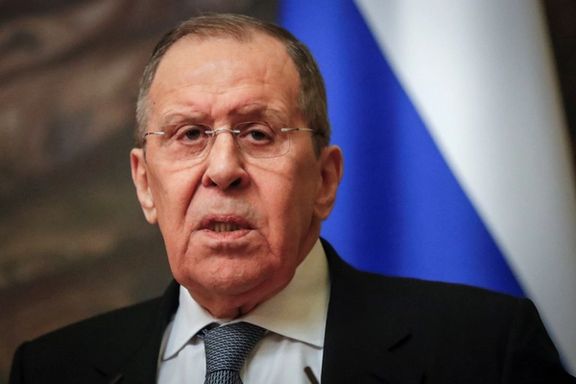
Foreign Minister Sergei Lavrov says Russia never betrays Iran and does not pursue selfish interests in the reinstatement of the 2015 nuclear deal despite a possible boost to world oil supplies.

Foreign Minister Sergei Lavrov says Russia never betrays Iran and does not pursue selfish interests in the reinstatement of the 2015 nuclear deal despite a possible boost to world oil supplies.
"We never betray our friends in politics. Venezuela is our friend, and Iran is a state that is very close to us. Secondly, we do not pursue selfish interests, unlike the Americans", he told finalists in the Leaders of Russia competition.
"You can see what they [the Americans] are actually doing, trying to spite Russia and teach it a lesson,” Lavrov added by considering adding Iranian, Venezuelan and other oil supplies to the international market.
"So, the Americans have been contacting Saudi Arabia, the Emirates and Qatar regarding oil and gas. All of those countries, just like Venezuela and Iran, clearly said: when we discuss issues pertaining to the appearance of new actors in the oil market, all of us are committed to the OPEC+ format, where quotas for every actor are discussed and agreed upon by consensus", he said, noting that "For now, I see no reason to believe that this mechanism may somehow be dismantled. No one is interested in that”.
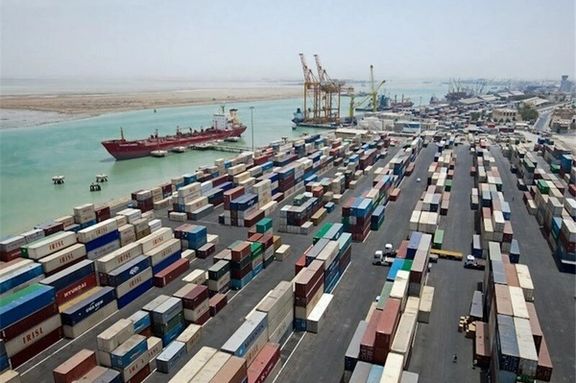
Iran has reportedly signed a deal with Russia to import 20 million tons of basic goods, including vegetable oil, wheat, barley and corn.
NourNews, which is affiliated with the secretary of Iran's Supreme National Security Council (SNSC), Ali Shamkhani, said on Saturday that Iran’s Agriculture Minister Javad Sadatinejad signed the agreement during a visit to Russia last week.
NourNews did not report the monetary value of the deal.
The report said the deal is to address concerns about shortages of basic goods and livestock feed in the next Iranian year, starting on March 21.
Iran eliminated a major subsidy for importing food and animal feed recently, raising fears of rising prices in the new year. According to a report by ISNA on Saturday, out of about $19 billion worth of basic goods imported in the past 12 months nearly $15 billion was subsidized with cheap dollars provided to importers.
Earlier in March, the parliament decided to scrap the multi-billion-dollar subsidy for essential food and medicines, despite warnings of more inflation and hardship.
The idea to eliminate the subsidy emerged after hardliner president Ebrahim Raisi (Raeesi) assumed office in August and could count on backing from conservatives and ultra-conservatives in control of Iran’s parliament.
The deputy head of Iran’s Customs Administration, Foroud Asgari, said about 30 million tons of basic goods have been cleared through customs and entered the country.
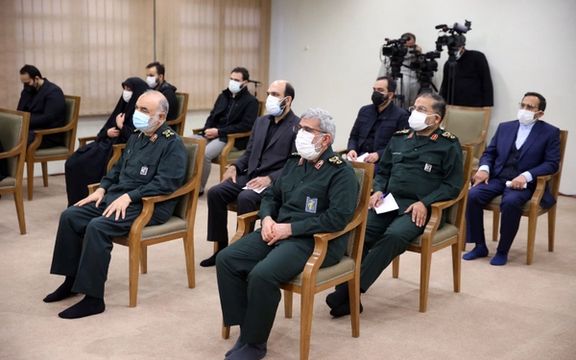
Iranian analysts abroad say it is unlikely Tehran would limit activities of the Revolutionary Guard just to have its terror designation lifted by Washington.
Observers in Iran and abroad have been saying during the past weeks that the issue of the IRGC's designation as a foreign terrorist organization (FTO) is the main hinderance to a renewed nuclear agreement between Tehran and Washington.
Mehdi Mahdavi Azad in Germany and Houshang Hassanyari, a military analyst in Canada, expressed skepticism to Iran International TV on Saturday about Iran's willingness to seriously limit the role of IRGC and its Qods Force.
When on Friday reporters asked White House Press Secretary Jen Psaki how far the Biden administration is ready to go in its attempt to salvage the remains of the Obama-era nuclear deal with Iran, she evaded the question.
Psaki said negotiations were still ongoing and had nothing more to offer. Meanwhile, she refused to address their concern about whether secret negotiations with Iran "are turning into negotiations with terrorists."
Mahdavi termed the secret negotiations between Iran and the United States over the IRGC issue, "JCPOA-2". He pointed out that in fact this was the term Supreme Leader Ali Khamenei had used in a March 2016 speech. According to Mahdavi, Khamenei defined JCPOA-2 as a model the United States and other Western states had suggested for reducing tensions in the region. "Khamenei said at the time that if he accepted the idea, the Westerners would then ask for the disbanding of the IRGC Qods Force," Mahdavi said.
The analysts maintained that whatever the world knows as Iran's revolutionary foreign policy fully involves the IRGC and its Qods Force. If Tehran is negotiating with Washington over IRGC’s role, it simply wants to make sure that the terrorist designation is lifted.
Asked if this could change the Islamic Republic's foreign policy, Hassanyari said: "This would be the biggest retreat for the Islamic Republic and its leader Khamenei. The IRGC's role in the region has been one of the most important problems US officials are focused on." Hassanyari agreed with Mahdavi that it is the IRGC carries out the Tehran's regional policy.
Mahdavi said the reason the Islamic Republic has not admitted that talks are taking place about the role of the IRGC, is because people in Iran will ask why Khamenei had not done this during the past ten years and allowed a large part of the population to go into poverty. Naturally, if Khamenei has to negotiate with America, it has to be done secretly. Mahdavi added that the Iranian regime might have to undermine its credibility before its own supporters and give bigger concessions to the West if it feels that it is the only way out of problems it faces.
Hassanyari said that the fate of Iran's proxy groups in the region are also part of the negotiations. This will further humiliate the Islamic Republic both at home and in those countries where it has heavily invested to build influence.
In another part of the interview, Mahdavi said that the Obama administration ignored the demands of regional countries including Israel when it forged the 2015 agreement with Iran. However, the Biden administration is paying more attention to the growing concerns in Israel and Arab countries about a compromise with Tehran particularly as Iran has been launching attacks on some Arab countries and intervening in the affairs of other Arab states.
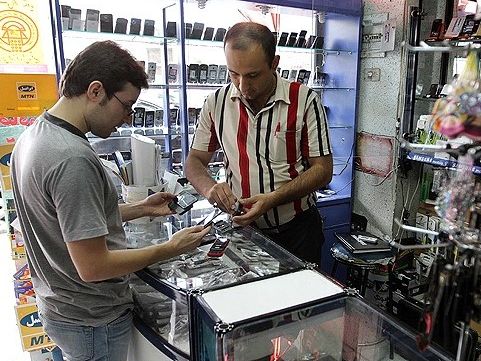
Iran with a population of 84 million has imported over 18 million mobile phones in the last 12 months, with Samsung and Xiaomi having the largest market share.
The spokesman for the association of mobile phone importers, Mohammadreza Aalian, told IRNA that Samsung had a 48-percent market share with 8,710,000 phones of different models worth nearly $1.88 billion.
Chinese brand Xiaomi had 28 percent of the market with 5,210,000 million cellphones, which totaled about $1.1 billion.
The third brand was Nokia with 12 percent or 2,250,000 that was worth only $54 million because most were simple devices, not smartphones.
Apple had a 6-percent share with 1,030,000 phones worth $1.35 billion, making it the runner-up in terms of the total value.
According to an earlier report by Tasnim news agency, Iran spent $9 billion in foreign currency to import 45 million cellphones in 33 months, until the end of 2021, with a large portion going for “luxury” devices with a price tag of over $600.
According to Tasnim’s data, around one quarter of the money, or about $2.3 billion was spent on importing just two million luxury phones – mainly from the American brand Apple. This is less than five percent of the total number of phones bought by the people. Buying such cellphones is too extravagant for most Iranians with ordinary nine-to-five jobs who are paid about $100 to $200 per month.
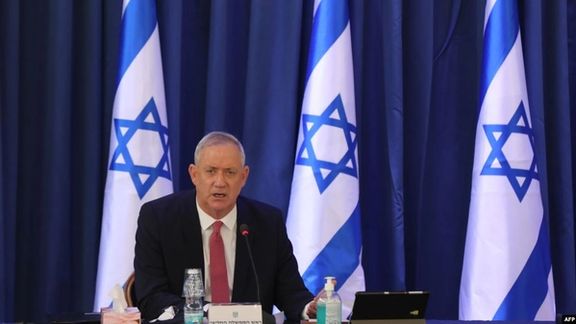
Israel's Kan 11 television says defense minister Benny Gantz refused to join a statement, openly opposing the US over delisting of Iran's Revolutionary Guards.
Prime Minister Naftali Bennet and Foreign Minister Yair Lapid issued a statement on Fridaycriticizing what they said was US intentions to remove the Revolutionary Guards (IRGC) from the foreign terrorist organizations blacklist. They appealed to the United States not to delist the top military force of its arch-foe, which it considers as a threat to Israel's existence.
The state-owned Kan 11 on Friday said that Gantz refused to sign the scathing statement.
Gantz spoke with the US Defense Secretary Lloyd Austin hours after the statement issued and thanked the US Senate for approving a $4.8 billion defense aid package for Israel. According to a statement issued by the Defense Minister's office, Gantz and Austin "discussed the details of the emerging nuclear agreement and Israel's position regarding its components."
The delisting of the IRGC appears to be Iran's last condition for signing a deal after nearly a year of intense negotiations to restore the 2015 nuclear agreement, the Joint Comprehensive Plan of Action (JCPOA).
Kan 11 said Israel does not believe that Iran will abide by any commitments it may make in a new deal. Reports have said that US is seeking a guarantee from Tehran to curtail IRGC activities beyond Iran’s borders.
"The attempt to delist the Iran's Revolutionary Guards as a terrorist organization is an insult to the victims,' Israeli Prime Minister Bennett and Foreign Minister Lapid say in a joint statement Friday.
The statement comes after State Department spokesman Ned Price on Wednesday said Washington and Tehran were "close to a possible deal" but "not there yet". "We do think the remaining issues can be bridged," he added.
Under former President Donald Trump in 2019, the United States designated the IRGC as a "foreign terrorist organization" after unilaterally withdrawing from the JCPOA and imposing draconian sanctions on the Islamic Republic.
"Prime Minister Naftali Bennett and his ministers don’t make a habit of squabbling publicly with the Americans, but they have plenty of complaints about flaws in the new agreement, which they believe will leave Israel in a more dangerous position than after the original 2015 nuclear deal," a commentary in Israel's Haaretz on Friday said.
The White House Spokeswoman Jen Psaki said Thursday that there is "ongoing negotiation" over delisting the IRGC. "I’m not going to get into specifics of it.But I would just note that the status quo where we stand has done nothing to make us safer in any regard.In fact, the Islamic Revolutionary Guard has only been strengthened," she said.
Psaki also said the notion that the actions of the past administration pulling out of the Iran nuclear deal has reduced the actions or the escalatory behavior of the Iranian Revolutionary Guard "is inaccurate". "They’ve actually -- the Iranian government has actually doubled their budget or something like that," she added.
Iranian officials have not recently spoken of delisting the IRGC as a condition to signing an imminent deal but on March 9 a member of the parliament's National Security and Foreign Policy Committee, Hossein Noushabadi, said the issue of delisting the IRGC had repeatedly been discussed during the talks in Vienna with "promising results".
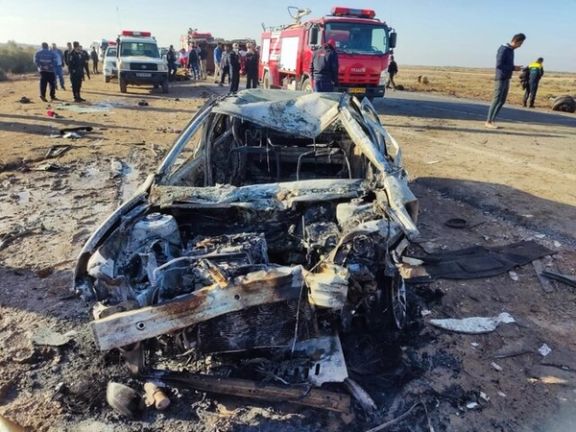
With the Iranian New Year, or Nowruz, holidays not yet started, at least 107 people have died in road accidents as traffic increases.
Announcing the figures on Saturday, the deputy head of Iran’s traffic police Teymour Hosseini said more people were taking intercity trips for Nowruz, which begins Sunday. Most of the accidents had occurred in Fars, Bushehr, Sistan-Baluchestan, and Yazd provinces, but Hosseini said traffic had increased everywhere, especially on roads to northern provinces near the Caspian.
As in many countries, restrictions on movement in place for the Covid-19 pandemic have been eased despite the continuing struggle with the Omicron variant: 782 have died in Iran in the past week, around the same as the United Kingdom but down from Iran’s peak of 4,444 in August.
Iran has a poor road safety record with annual fatalities around 20,000, although it is not in the top 50 globally according to World Health Organization reports for traffic fatalities per head of population. The fatality rate is lower than Saudi Arabia. Lebanon, Kyrgyzstan and Yemen, but higher than Iraq, Armenia, and the United Arab Emirates.
The toll is variously blamed on speed, poor quality of roads, lax inspection of vehicles, disregard for traffic laws, and inadequate emergency services. A 2017 report by Iran’s traffic police said that nearly 280,000 had been killed and more than 4 million injured in road accidents since 1998.